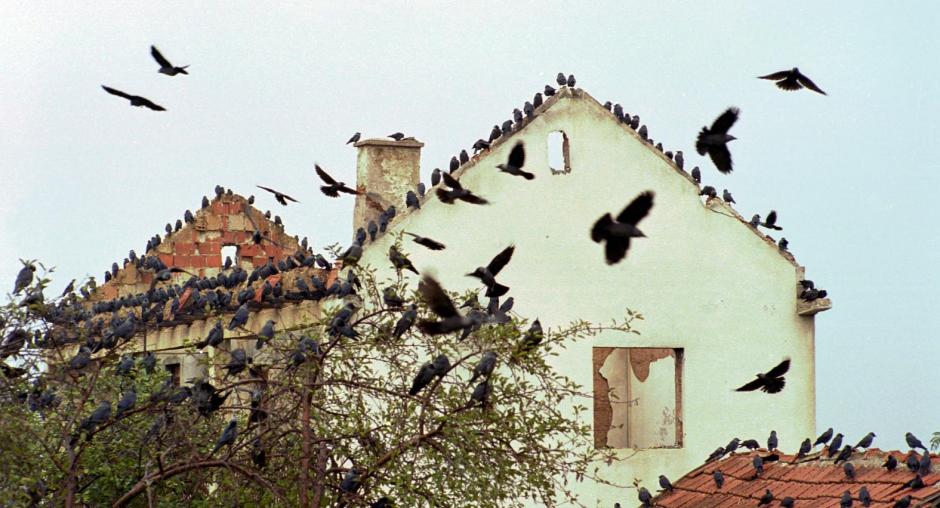Newsroom
Damage compensation laws should be consistent with European Court ruling, OSCE Croatia Head says
ZAGREB 21 January 2003

A large number of houses were destroyed during the war in Croatia. (Lubomir Kotek/OSCE) Photo details
ZAGREB, 21 January 2003 - Three draft laws on state compensation for damages adopted by the Government of Croatia last week do not remedy legal problems identified by the European Court on Human Rights in 2002 and should therefore be revised, the Head of the OSCE Mission to Croatia, Ambassador Peter Semneby said on Tuesday.
The laws should provide a full remedy for those affected by Parliament's 1996 suspension of all court proceedings seeking compensation for damages resulting from terrorist acts initiated under Article 180 of the Law on Obligations. They should similarly provide a remedy for those affected by Parliament's 1999 suspension of all court proceedings for damages caused by Croatian armed forces and police between 1990 and 1996. Finally, they should regulate the obligations for damages to individuals that Croatia inherited as a successor to the former Socialist Federal Republic of Yugoslavia (SFRY).
The OSCE Mission to Croatia has previously offered to provide advice to the Government on these issues, together with the EU, the United Nations and other international partners through the joint legal working group established with the Government.
A draft law on compensation for damages by terrorist acts sent to Parliament last Thursday permits only claims for personal injury, although the suspended law allowed claims for property damage and destruction.
"It is not consistent with Croatia's international law commitments that court judgments awarding compensation for property damage as well as pending claims are retroactively extinguished. This would be the case if Parliament were to adopt the draft law on terrorist acts as currently written", Semneby said.
The Government's obligation to regulate this issue stems from the March 2002 judgement of the European Court of Human Rights in Kutic v. Croatia finding that Parliament's suspension of pending court cases under Article 180 of the Law on Obligations, in the absence of new legislation, violated the right of access to court. Under the Government's proposed law, the Kutic family who sought compensation for property destruction would no longer have a claim for compensation.
The draft law on compensation for damages caused by members of Croatian armed forces and police between 1990 and 1996 similarly does not remedy Parliament's 1999 suspension of pending cases. The draft law appears to exclude virtually all compensation for damage caused by the armed forces and the police given the broad retroactive definition of "war damage" for which the state is not responsible. Recently, the European Court accepted several cases to review whether the 1999 suspension of pending court cases violates the right of access to court.
The third draft law regulates Croatia's obligation to pay compensation for damages to individuals for which the former SFRY was responsible prior to Croatia's independence. The proposed limitation on claims to citizens and non-citizens from states with reciprocity raises concerns that some injured parties may be left without a remedy.
The laws should provide a full remedy for those affected by Parliament's 1996 suspension of all court proceedings seeking compensation for damages resulting from terrorist acts initiated under Article 180 of the Law on Obligations. They should similarly provide a remedy for those affected by Parliament's 1999 suspension of all court proceedings for damages caused by Croatian armed forces and police between 1990 and 1996. Finally, they should regulate the obligations for damages to individuals that Croatia inherited as a successor to the former Socialist Federal Republic of Yugoslavia (SFRY).
The OSCE Mission to Croatia has previously offered to provide advice to the Government on these issues, together with the EU, the United Nations and other international partners through the joint legal working group established with the Government.
A draft law on compensation for damages by terrorist acts sent to Parliament last Thursday permits only claims for personal injury, although the suspended law allowed claims for property damage and destruction.
"It is not consistent with Croatia's international law commitments that court judgments awarding compensation for property damage as well as pending claims are retroactively extinguished. This would be the case if Parliament were to adopt the draft law on terrorist acts as currently written", Semneby said.
The Government's obligation to regulate this issue stems from the March 2002 judgement of the European Court of Human Rights in Kutic v. Croatia finding that Parliament's suspension of pending court cases under Article 180 of the Law on Obligations, in the absence of new legislation, violated the right of access to court. Under the Government's proposed law, the Kutic family who sought compensation for property destruction would no longer have a claim for compensation.
The draft law on compensation for damages caused by members of Croatian armed forces and police between 1990 and 1996 similarly does not remedy Parliament's 1999 suspension of pending cases. The draft law appears to exclude virtually all compensation for damage caused by the armed forces and the police given the broad retroactive definition of "war damage" for which the state is not responsible. Recently, the European Court accepted several cases to review whether the 1999 suspension of pending court cases violates the right of access to court.
The third draft law regulates Croatia's obligation to pay compensation for damages to individuals for which the former SFRY was responsible prior to Croatia's independence. The proposed limitation on claims to citizens and non-citizens from states with reciprocity raises concerns that some injured parties may be left without a remedy.
